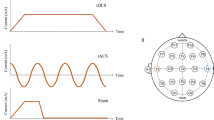Abstract
The effect of rapid-repetitive transcranial magnetic stimulation (rr-TMS) on the immediate verbal and visuospatial memory span was assessed by computerized neuropsychological testing in 11 healthy volunteers. The objective was to test whether rr-TMS may be utilized as a non-invasive tool for evaluation of memory function. The subjects had to memorize series of numbers (Digit-Span test) or the position of cubes (Corsi-Block test) shown to them on a computer screen and actively reproduce them immediately after the presentation. Synchronous with the appearance of each item an rr-TMS train of 550 ms duration was delivered to the left or right anterolateral parietal as well as superior and posterior lateral temporal region at 50 Hz and with approximately 1.0 T stimulation intensity. Statistical comparison of memory performance during rr-TMS and baseline testings without stimulation revealed no significant changes. No adverse effects were observed. Thus, rr-TMS does not affect short-term memory performance in healthy individuals under the stimulation conditions described above.
Similar content being viewed by others
References
Agnew WF, McCreery DB (1987) Considerations for safety in the use of extracranial stimulation for motor evoked potentials. Neurosurgery 20:143–147
Amassian VE, Cracco RQ, Maccabee PJ, Cracco JB, Rudell A, Eberle L (1989) Suppression of visual perception by magnetic coil stimulation of the visual cortex. Electroencephalogr Clin Neurophysiol 74:458–462
Ammon K, Gandevia SC (1990) Transcranial magnetic stimulation can influence the selection of motor programmes. J Neurol Neurosurg Psychiatry 53:705–707
Barker AT, Freeston IL, Jalinous R, Merton PA, Morton HB (1985) Magnetic stimulation of the human brain. J Physiol (Lond) 369:3P
Beckers G, Hömberg V (1991) Impairment of visual perception and visual short term memory scanning by transcranial magnetic stimulation of occipital cortex. Exp Brain Res 87:421–432
Bridgers SL, Delaney RC (1989) Transcranial magnetic stimulation: an assessment of cognitive and other cerebral effects. Neurology 39:417–419
Chapman L, Markham C, Rand R, Crandall P (1976) Memory changes induced by stimulation of hippocampus or amygdala in epileptic patients with implanted electrodes. Trans Am Neurol Assoc 92:50–56
Claus D (1991) Magnetic stimulation: technical aspects. Electroencephalogr Clin Neurophysiol [Suppl] 43:249–254
Cracco RQ, Amassian VE, Maccabee PJ, Cracco JB (1990) Excitatory and inhibitory effects of magnetic coil stimulation of human cortex. Electroencephalogr Clin Neurophysiol 41 [Suppl]:134–139
Dhuna A, Gates J, Pascual-Leone A (1991) Transcranial magnetic stimulation in patients with epilepsy. Neurology 41:1067–1071
Eichhorn KF, Arnolt B, Claus D, Heinrich W, Sembach O, Schreivogel K (1990) Induktive Stimulation. Biomed Tech (Berlin) 35:139–144
Ferbert A, Mussmann N, Menne A, Buchner H, Hartje W (1991) Short-term memory performance with magnetic stimulation of the motor cortex. Eur Arch Psychiatry Clin Neurosci 241:135–138
Hufnagel A, Elger CE (1991) Responses of the epileptic focus to transcranial magnetic stimulation. Electroencephalogr Clin Neurophysiol 43 [Suppl]:86–99
Hufnagel A, Elger CE, Marx W, Ising A (1990) Magnetic motor evoked potentials in epilepsy: effects of the disease and of anticonvulsant medication. Ann Neurol 28:680–686
Kling JW, Yarita M, Yamamoto T, Matsumiya Y (1990) Memory for conditioned taste aversion is diminished by transcranial magnetic stimulation. Physiol Behav 48:713–717
Lezak MD (1983) Neuropsychological assessment. Oxford University Press, New York
Maccabee PJ, Amassian VE, Cracco RQ, Cracco JB, Rudell AP, Eberle LP, Zemon V (1991) Magnetic coil stimulation of human visual cortex: studies of perception. Electroencephalogr Clin Neurophysiol 43 [Suppl]:111–120
Ojemann GA (1987) Intraoperative functional mapping at the University of Washington, Seattle. In: Engel J (ed) Surgical treatment of the epilepsies. Raven Press, New York, pp 635–639
Pascual-Leone A, Gates JR, Dhuna A (1991) Induction of speech arrest and counting errors with rapid-rate transcranial magnetic stimulation. Neurology 41:697–702
Penfield W, Roberts L (1959) Speech and brain mechanism. Princeton University Press, Princeton
Author information
Authors and Affiliations
Rights and permissions
About this article
Cite this article
Hufnagel, A., Clause, D., Brunhoelzl, C. et al. Short-term memory: no evidence of effect of rapid-repetitive transcranial magnetic stimulation in healthy individuals. J Neurol 240, 373–376 (1993). https://doi.org/10.1007/BF00839970
Received:
Revised:
Accepted:
Issue Date:
DOI: https://doi.org/10.1007/BF00839970




